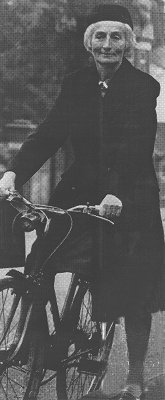 |
It was August 1939 when I first left Ireland and our home in county Clare. My family had agreed to me joining my older sister at Hallam hospital West Bromwich to train in general nursing and midwifery. It wasn't long before I was thinking about going home. I didn't like the noisy, dirty Black Country. I found it very hard to adapt to the industrial surroundings, even though I had taken to the local people who were very kind and helpful. Within a few weeks of my arriving in England war had been declared and I was determined to finish my training. During the months of the phoney war the staff from the hospital went into West Bromwich town centre to take part in simulated air raid. We lay on the ground and pretended to be casualties. We had labels attached to our uniforms saying that we had been blown-up or burnt or something similar. We had to wait until an ambulance arrived to take us away. Not long after we experienced the reality of war. Our civilian patients were taken from Hallam to a hospital in Gloucestershire so that we would have room for Dunkirk survivors. Many of these men had horrific wounds and burns. |
Apart from giving these soldiers medical care we regularly took them to nearby cinemas and theatres. The cinema and theatre staff gave all Dunkirk patients free admission.
One particular soldier, who had suffered terrible burns, learned how to knit during his recovery. He became so good he made me a scarf. I cherished it for years until I passed it on to my daughter Collette.
In the war the hospital sister had to make sure all the nurses living in the three storey nurses home got to the shelter during air raids. Some nurses would avoid going by locking themselves in their wardrobes.
I remember the evening that the Sister Dora Hospital in Walsall was bombed and some of their patients had to be moved to Alum Hospital.
In 1947 I transferred to the Manor Hospital in Walsall after doing my field training. I had spent time with a midwife on her daily visits to see expectant mothers.
It was 1948 when I met my future husband Daniel Clifford. At the time he lived in Wolverhampton and worked at the Canon foundry in Coseley. We got married in Walsall in 1949 and went to live in Green Lanes Bilston. In 1950 John was born. He was the first of my nine children. He was followed by Collette 1952, Bernadette 1954, Philomena 1955, Theresa 1956, Kevin 1957, Brendan 1960, Desmond 1962 and finally Carmen 1964.
I eventually took up the post of District Nurse covering the Bilston and Coseley area. In those days district nurses had to visit patients to give injections. I carried a bag with a syringe in it. We had to boil the syringe in hot water every time we used it. Patients needing an injection would have been given a prescription to get the medicine from the chemist ready for when I arrived.
Also I advised patients, telling them things like how to avoid bed sores, how to cope with incontinence, and the importance of regular exercises after a stroke.
Most babies were home births in those days. We used to put newspaper on the floor and paper on the bed and old sheets were torn up into small squares to make pads. Usually a neighbour would be there to make drinks, boil water and take care of any older children in the family. Every midwife carried a case book for recording date of birth, the time the labour started, any drugs used, the sex of the baby, its weight and the condition of baby and mother.
Right up until I retired, in 1980, I made all my calls on my pedal cycle. I believe that I was the last district nurse to do so.
In the end I am glad that I did decide to stay in the Black County all those years ago.